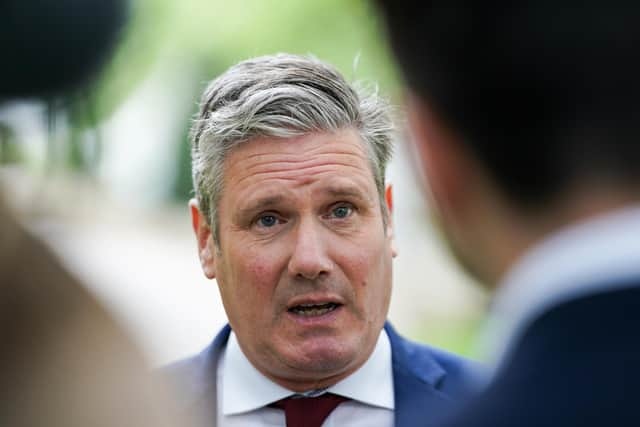Keir Starmer's stance over unions one of numerous trust issues - Bill Carmichael
Evidence of this nascent civil war on the left emerged this week with the sacking of Corbynista MP Sam Tarry from the Labour front bench after he appeared on a picket line with striking rail workers.
Party officials say he was dismissed for making unauthorised media appearances, but many on the left of the party claimed he paid the price for standing up for striking workers.


Advertisement
Hide AdAdvertisement
Hide AdThe fact that Tarry is a close friend of Sir Keir Starmer’s deputy, Angela Rayner, adds an extra piquancy to this little drama.
Whatever the motives behind this spat, one thing is clear – Sir Keir and his team are determined to put as much distance as they possibly can between the leadership and Labour’s left wing.
For example, aware that the party is open to the Tory gibe that Labour is in the pocket of the unions, the leadership has been keen to discourage shadow ministers from appearing on picket lines.
Why the sudden sensitivity? Haven’t Labour MPs always joined picketing workers? The answer, as is often the case, is the heady whiff of power.
Advertisement
Hide AdAdvertisement
Hide AdOpinion polls are consistently putting Labour ahead of the Conservatives – although not as much as they should be – and with an election less than two years away, no doubt Sir Keir can envision the day when he can cross the threshold of Number 10. But that relies on convincing the British people that Labour can be trusted with the nation’s finances, and that means severing connections with the Corbyn years and the disastrous election defeat of 2019.
Sir Keir must be hoping that voters have very short memories. Because when Jeremy Corbyn was leader, Sir Keir was one of his keenest supporters. Indeed, two years ago in the leadership battle that took place in the wake of that election defeat, Sir Keir presented himself as the Corbyn continuity candidate.
He went so far as to make 10 pledges – still available on his website – to prove his far left credentials, including increasing taxes on the top five per cent of earners, abolishing Universal Credit, “standing shoulder to shoulder” with the trade unions and nationalising “rail, mail, energy and water”.
These have largely been unceremoniously ditched. For example, Rachel Reeves, Leeds West MP and Shadow Chancellor, made it clear in an interview this week that nationalisation “just doesn’t stack up against our fiscal rules”. This U-turn has infuriated the left and led to allegations of betrayal and deception.
Advertisement
Hide AdAdvertisement
Hide AdBitter infighting is nothing new to Labour. Last week the party released the long-awaited Forde report that revealed that throughout Corbyn’s time as leader, the left and centrist factions of Labour were at each other’s throats. The events of the last week confirm this bitter conflict has not yet been resolved.
We shouldn’t forget either that Sir Keir was the architect of the disastrous “People’s Vote” strategy – after having previously pledged to respect the result of the 2016 Brexit referendum.
This was one of the key factors that demolished the “Red Wall” of previously safe Labour-held seats in the North and Midlands and handed Boris Johnson a landslide election victory.
Sir Keir’s struggle with his party’s left wing is reminiscent of the machinations of Tony Blair, who successfully persuaded Labour to ditch Clause IV of the rulebook that committed the party to the socialist ideal of “common ownership of the means of production, distribution and exchange” in 1995.
Advertisement
Hide AdAdvertisement
Hide AdTo be fair to the current leader, perhaps in emulating Blair he is simply being pragmatic and recognising that elections are won from the moderate centre, and not from the extremes of right or left.
And his supporters would no doubt point out that after his Clause IV victory, Blair went on to become Labour’s most effective election-winning leader in its history. And perhaps it is naive to criticise politicians for being hungry for power. After all, what is the point of going into politics if you never have the chance of making your ideas a reality?
But as pragmatic and realistic this strategy may be, I can spot one possible major problem. Sir Keir will no doubt go into the next election portraying himself as a straight dealer in sharp contrast to the duplicity the Tories have shown in recent months.
But there is nothing straight about promising to respect a referendum result, and then plotting to undermine it; or backing Corbyn and then distancing yourself from him; or pledging a raft of left wing ideas, such as nationalisation, and then reneging from those pledges for reasons of political expediency.
Voters will look at these facts and ask themselves – can we trust him?
